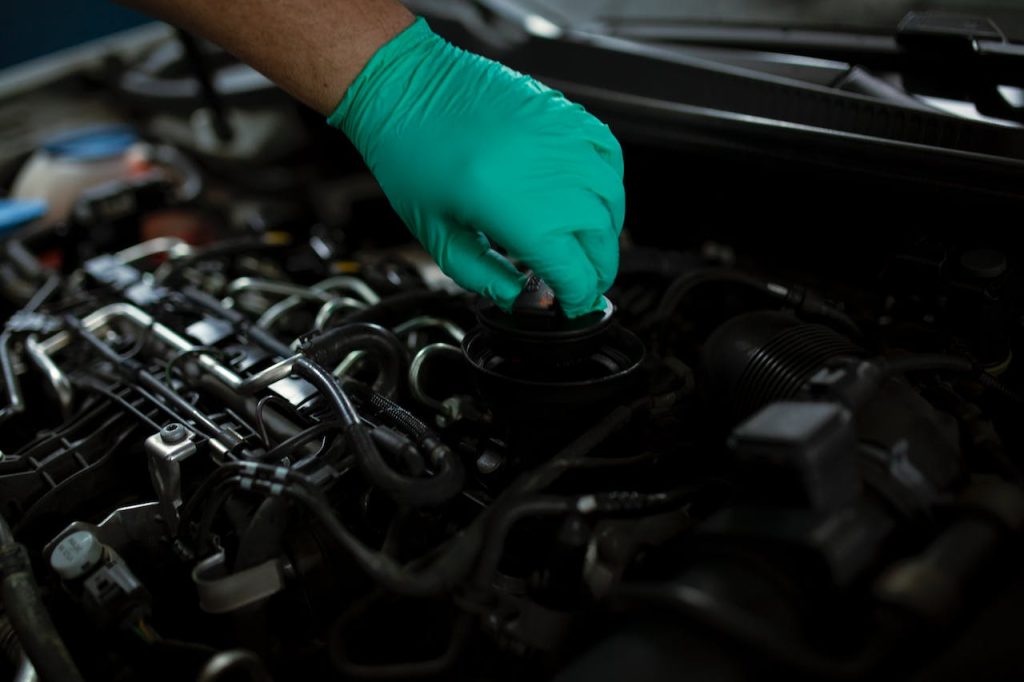
Source: Pexels
Are you looking to save some money on your next oil change? Or maybe you’re just curious about the difference between doing it yourself and having a professional do it for you. Well, look no further because we are here to break down the pros and cons of each option.
How To Change Your Own Oil
Changing your own oil can seem like a stressful process but with the right tools is actually a simple, step-by-step procedure.
Learn how to change the oil in a car with our guide:
- Gather your supplies: You’ll need new oil and a filter, an oil pan, a funnel, and a wrench or socket set.
- Locate the oil filter and drain plug. These are typically found underneath the car, so you may need a jack to lift it up.
- To drain the oil, place the oil pan under the drain plug and unscrew it. Once the oil is drained, put it in its old bottle and bring it to your local auto parts store for disposal.
- Use your wrench or socket set to remove the old filter and replace it with the new one.
- Using your funnel, add in the new oil until you reach the correct level on the dipstick.
While this may seem like a straightforward process, it does require some time and effort on your part. Make sure you have the right tools and knowledge to do it right.
Going to a Dealership
On the other hand, going to a dealership or mechanic is the easier option. You simply drop off your car, relax in their waiting room, and their mechanics will take care of everything for you. However, paying for this convenience is not for everyone.
Some other benefits of visiting a dealership:
- Speed and convenience: Going to a dealership will save you time and effort especially if you schedule ahead.
- Expertise: Trust a trained technician to get your oil changed right the first time.
- Warranty maintenance: If your car is still under warranty, getting regular oil changes at the dealership will ensure your warranty stays valid.
- Added services: In addition to changing your oil, dealership technicians may also perform a multi-point inspection and top off other fluids in your car.
Common Oil Change Questions
How Often to Change Oil In My Car?
While the general rule of thumb is to change your oil every 3,000 miles or 3 months, this may vary depending on your car’s make and model. It’s best to consult your owner’s manual for specific recommendations.
Can I Use Any Type of Oil?
No, it’s important to use the type of oil recommended by your car manufacturer. This can vary based on factors such as climate and driving habits. Consult your owner’s manual for the correct type and viscosity of oil to use.
Can I Reuse Old Oil?
No, it’s important to dispose of old oil properly and use fresh, new oil for each oil change. Reusing old oil can lead to engine damage and decrease the effectiveness of your oil.
What Does an Oil Change Light Mean?
The oil change light in your car typically indicates the end of your oil’s lifecycle. However, there can also be other problems indicated by an oil change light. It’s always best to check your owner’s manual for specific instructions on how to reset the light after an oil change.
Making the Decision
Ultimately, the decision between doing your own oil change or going to a dealership comes down to cost and convenience. If you prefer having someone else handle it, you’ll receive excellent service at a Ford dealership. Oil changes done at home can be easy if you have the time, tools, and knowledge to do it yourself. This can also save you money.
Whichever option you choose, make sure to keep up with regular oil changes to keep your car running smoothly. The experienced technicians at Capital Ford of Wilmington will ensure that your car is in top shape. You can even save money by taking advantage of our coupons for your Ford oil change. Visit our service center today for your oil change!




